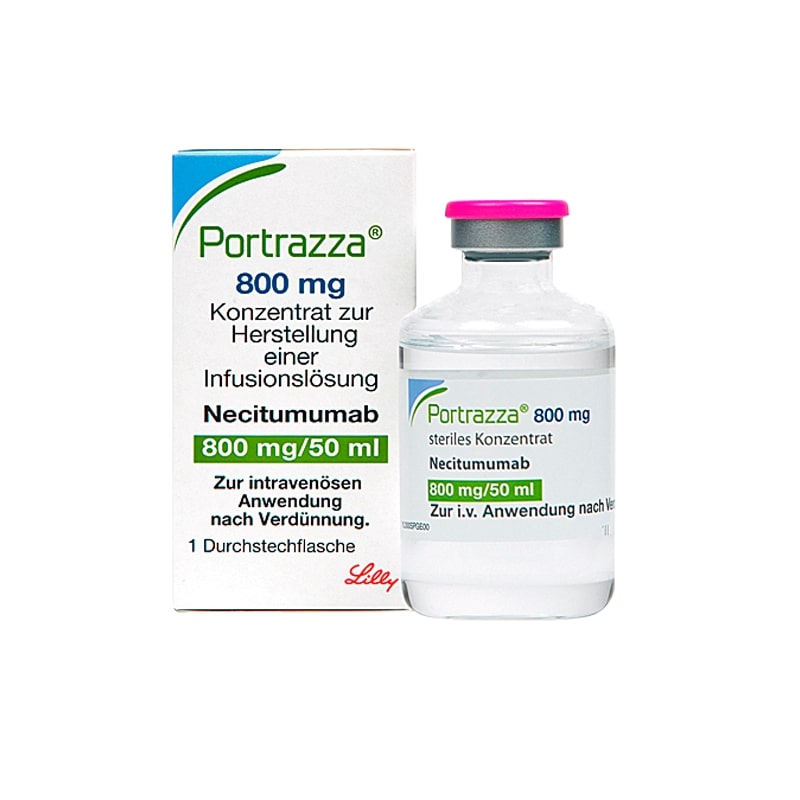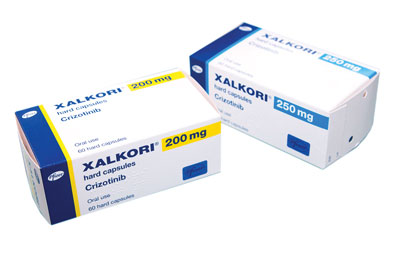Portrazza (necitumumab) vs Xalkori (crizotinib)
Portrazza (necitumumab) vs Xalkori (crizotinib)
Portrazza (necitumumab) is a monoclonal antibody designed to target the epidermal growth factor receptor (EGFR) and is approved for use in combination with chemotherapy for the treatment of metastatic squamous non-small cell lung cancer (NSCLC) that has not been previously treated with chemotherapy. Xalkori (crizotinib), on the other hand, is a small molecule tyrosine kinase inhibitor specifically targeting the anaplastic lymphoma kinase (ALK) and ROS1 receptors, and it is indicated for the treatment of NSCLC that is ALK or ROS1-positive. The choice between Portrazza and Xalkori would largely depend on the specific molecular characteristics of the NSCLC; therefore, molecular testing for EGFR, ALK, and ROS1 is essential to determine the most appropriate therapy for an individual patient.
Difference between Portrazza and Xalkori
| Metric | Portrazza (necitumumab) | Xalkori (crizotinib) |
|---|---|---|
| Generic name | Necitumumab | Crizotinib |
| Indications | Metastatic squamous non-small cell lung cancer (NSCLC) | Non-small cell lung cancer (NSCLC), ALK or ROS1-positive |
| Mechanism of action | Epidermal growth factor receptor (EGFR) antagonist | ALK and ROS1 tyrosine kinase inhibitor |
| Brand names | Portrazza | Xalkori |
| Administrative route | Intravenous infusion | Oral |
| Side effects | Rash, magnesium depletion, venous thromboembolism | Visual disorders, gastrointestinal effects, edema |
| Contraindications | None known specifically; use caution in patients with cardiovascular or respiratory conditions | Hepatic impairment, interstitial lung disease, bradycardia |
| Drug class | Monoclonal antibody | Tyrosine kinase inhibitor |
| Manufacturer | Eli Lilly and Company | Pfizer |
Efficacy
Efficacy of Portrazza (necitumumab) in Lung Cancer
Portrazza (necitumumab) is a monoclonal antibody designed for the treatment of metastatic squamous non-small cell lung cancer (NSCLC). It targets the epidermal growth factor receptor (EGFR), which is often overexpressed in squamous NSCLC cells. The efficacy of Portrazza was evaluated in a clinical trial involving patients with advanced squamous NSCLC. When used in combination with chemotherapy (gemcitabine and cisplatin), Portrazza showed a statistically significant improvement in overall survival compared to chemotherapy alone. However, it is important to note that Portrazza is specifically indicated for use in patients with squamous NSCLC and not for other subtypes of lung cancer.
Efficacy of Xalkori (crizotinib) in Lung Cancer
Xalkori (crizotinib) is an oral small-molecule inhibitor of the anaplastic lymphoma kinase (ALK) and is used in the treatment of ALK-positive NSCLC. The presence of an ALK rearrangement, which occurs in a subset of NSCLC patients, is a prerequisite for the use of Xalkori. Clinical trials have demonstrated that Xalkori is highly effective in shrinking tumors in patients with ALK-positive NSCLC. The drug has shown a significant improvement in progression-free survival compared to standard chemotherapy in this patient population. Additionally, response rates with Xalkori are notably high, with many patients experiencing a rapid and durable response to treatment.
It is critical to differentiate between the patient populations for which each of these drugs is intended. While Portrazza is used in combination with chemotherapy for squamous NSCLC, Xalkori is targeted towards a genetically defined subset of NSCLC with ALK rearrangements. The efficacy of each medication is closely linked to the specific characteristics of the lung cancer being treated, emphasizing the importance of molecular testing and personalized medicine in the management of lung cancer.
Moreover, the efficacy of these drugs must be weighed against their safety profiles and potential side effects. Both Portrazza and Xalkori have been associated with unique adverse events that require careful monitoring. In conclusion, the efficacy of Portrazza and Xalkori in treating lung cancer is significant within their respective indications, and their use represents an advancement in the targeted therapy approach for NSCLC.
Regulatory Agency Approvals
Portrazza
-
European Medical Agency (EMA), European Union

-
Food and Drug Administration (FDA), USA

-
Health Canada

Xalkori
-
European Medical Agency (EMA), European Union

-
Food and Drug Administration (FDA), USA

-
Health Canada

-
Pharmaceuticals and Medical Devices Agency (PMDA), Japan

-
Therapeutic Goods Administration (TGA), Australia

Access Portrazza or Xalkori today
If Portrazza or Xalkori are not approved or available in your country (e.g. due to supply issues), you can access them via Everyone.org.
How it works

Make an enquiry
Choose the medicine you want to buy, answer a couple of questions, and upload your prescription to speed things up. We’ll get back to you within 24 hours.


Make an enquiry
Choose the medicine you want to buy, answer a couple of questions, and upload your prescription to speed things up. We’ll get back to you within 24 hours.


Breeze through the paperwork
We'll guide you through the required documents for importing unapproved medicine, ensuring you have all the necessary information.


Get a personalized quote
We’ll prepare a quote for you, including medicine costs and any shipping, administrative, or import fees that may apply.


Receive your medicine
Accept the quote and we’ll handle the rest - sourcing and safely delivering your medicine.

Some text on this page has been automatically generated. Speak to your physician before you start a new treatment or medication.
Let's talk
If you have any questions, call us or send us a message through WhatsApp or email:
Contact us




